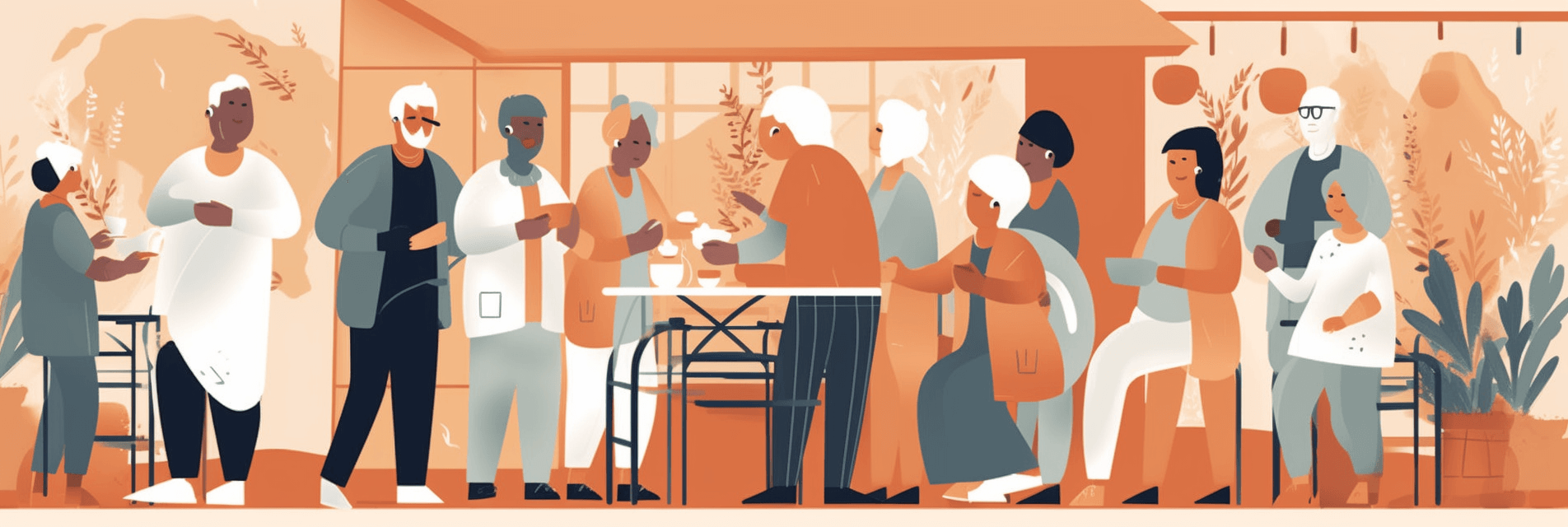As elder care providers, we understand the importance of providing top-notch care to our clients. However, in our increasingly diverse society, it’s crucial that we also recognize and respect the unique cultural needs of each individual we serve.
This is where cultural sensitivity comes into play – a vital component in delivering high-quality care and marketing our services effectively to reach those who need us most. By developing inclusive marketing strategies and building trust with potential clients from various backgrounds, we can better serve the growing senior population and ensure they receive the personalized care they deserve.
In this article, we’ll explore the importance of cultural sensitivity in elder care marketing and provide tips on identifying diverse cultural groups and their specific needs. We’ll discuss how to develop inclusive marketing strategies that resonate with these communities while avoiding cultural faux pas that could harm our reputation or alienate potential clients.
With an open-minded and respectful approach, we can create a more inclusive industry that genuinely serves all seniors’ best interests.
Understanding the Importance of Cultural Sensitivity in Elder Care Marketing
It’s crucial to recognize that embracing diversity and respecting traditions are vital in effectively reaching our aging population.
Cultural competence and inclusive outreach are essential components of elder care marketing, as they allow us to understand better the unique needs, preferences, and values of different cultural groups. By doing so, we can create more targeted and effective marketing strategies that resonate with a diverse range of seniors and their families.
Being open-minded, respectful, and knowledgeable about various cultures helps us connect with our audience on a deeper level and demonstrates our genuine commitment to serving others.
It’s essential for those working in elder care marketing to continuously educate themselves about different cultural practices and beliefs to provide relevant information while avoiding stereotypes or offensive content.
In this way, we can foster an environment of inclusivity where all seniors feel welcome, valued, and understood – which will ultimately lead to more successful campaigns and client relationships.
Identifying Diverse Cultural Groups and Their Unique Needs
We must consider demographics and preferences as we delve into identifying diverse cultural groups and their unique needs. It’s also important to consider cultural norms, beliefs, and values. We can better tailor our elder care services and marketing strategies by understanding these essential aspects. This will ensure that they are inclusive and respectful of all backgrounds.
This approach will foster a welcoming environment and ensure the highest quality of care for our seniors from various cultures.
Demographics and Preferences
Diving into demographics and preferences, we’ll uncover a gold mine of insights that can help us tailor our messages for the most captivating impact on our diverse audience.
Demographic targeting is essential in understanding the unique needs and preferences of various cultural groups within the elder care market. By analyzing factors such as age, ethnicity, language, religion, and socioeconomic status, we can identify commonalities and differences among our target audience.
Preference analysis further refines our approach by revealing specific desires or priorities these diverse communities hold regarding elder care.
Being open-minded, respectful, and knowledgeable about these demographic nuances allows us to create engaging marketing materials that resonate with each cultural group. For example, acknowledging different family structures, living situations, or caregiving traditions could foster a deeper connection with potential clients.
Additionally, incorporating culturally appropriate imagery or language into our marketing efforts demonstrates that we value their background and understand their needs personally.
Through careful demographic targeting and preference analysis, we can demonstrate genuine empathy toward serving others while effectively reaching out to the rich tapestry of cultures in today’s elder care landscape.
Cultural Norms, Beliefs, and Values
You’ll find that understanding and respecting various communities’ cultural norms, beliefs, and values plays a crucial role in creating meaningful connections and delivering tailored messages that truly resonate with your target audience. In our opinion, cultural competence is essential to genuinely serve diverse populations in elder care marketing, ensuring that we’re knowledgeable about different customs and sensitive to their unique needs.
This approach allows us to break down communication barriers while building trust and rapport, ultimately fostering effective collaboration between caregivers, elderly individuals, and their families. To achieve this level of cultural competence, we must immerse ourselves in our clients’ diverse backgrounds to understand their experiences, perspectives, and potential concerns.

By doing so, we show genuine respect for each person’s individuality while recognizing the shared values that unite us as human beings. Staying informed about current events within various ethnic communities helps us tailor our messaging and outreach efforts accordingly – ensuring we’re always putting forth an inclusive image supporting our mission of serving others with empathy and compassion.
Developing Inclusive Marketing Strategies
As we explore the importance of developing inclusive marketing strategies, let’s focus on tailoring messages for different audiences and using culturally appropriate imagery and language.
By understanding diverse cultural groups’ unique needs and preferences, we can create more effective marketing campaigns that foster a sense of belonging and respect for all elders in our care.
This approach will help us reach a wider audience and demonstrate our commitment to providing genuinely inclusive elder care services.
Tailoring Messages for Different Audiences
In this section, we’re focusing on customizing messages for various audiences. We want to ensure that our approach is as smooth as a well-oiled typewriter to reach and resonate with diverse individuals.
Multilingual messaging and diverse representation are vital to tailoring content to effectively engage different cultural backgrounds in elder care marketing. By presenting materials in multiple languages and showcasing the experiences of people from various walks of life, we demonstrate an understanding of their unique needs and background while fostering a sense of inclusivity.
To achieve this goal, it’s essential to collaborate with experts who have an intimate understanding of specific cultures or communities. They can help us craft culturally sensitive messages to our target audience’s hearts and minds.
This could involve adapting visuals or language to reflect cultural nuances or addressing concerns that might be more prevalent within specific communities. Remember to be open-minded, respectful, and knowledgeable when navigating these peaceful waters. It all contributes towards building trust with potential clients seeking elder care services for themselves or their loved ones.
Using Culturally Appropriate Imagery and Language
As we continue to explore the importance of cultural sensitivity in elder care marketing, it’s essential to recognize that tailoring messages for different audiences is just one piece of the puzzle.
To truly connect with diverse communities and show our commitment to serving their unique needs, we must also be mindful of using culturally appropriate imagery and language in our marketing materials.
Inclusive visuals play a significant role in making people from various cultural backgrounds feel seen and understood. By showcasing images representing the diversity of the communities we serve, we demonstrate our awareness and respect for these differences and foster a sense of belonging among potential clients.
Similarly, awareness of language barriers is crucial to communicate clearly with all community members. This can mean offering translated materials or working with interpreters during consultations or events.
These steps create an environment where everyone feels welcome and valued – a key aspect in building trust within diverse populations seeking elder care services.
Building Trust and Rapport with Potential Clients

Establishing genuine connections with potential clients is crucial, and it’s essential to create an atmosphere of trust and rapport that’ll make them feel valued and understood.
Building rapport with seniors from various cultural backgrounds requires us to be open-minded, respectful, and knowledgeable about their unique customs, beliefs, and traditions. Trust establishment is a crucial aspect of effective elder care marketing because when people trust us, they’re more likely to engage our services for themselves or their loved ones.
To build that trust and rapport with potential clients, we must first understand their specific needs by listening to their stories and concerns. Demonstrating empathy toward their situations will show them that we genuinely care about providing the best possible care for each individual.
Furthermore, offering tailored solutions based on our understanding of their culture can significantly boost confidence in our ability to provide culturally sensitive elder care services. In doing so, we create strong connections and foster an environment where everyone feels respected and valued – which ultimately leads to better outcomes for the seniors we serve.
Tips for Avoiding Cultural Faux Pas in Elder Care Marketing
To avoid any awkward cultural missteps in reaching out to seniors, here’s a handful of tips that’ll help you navigate diverse backgrounds with grace and ease.
First and foremost, be aware of elderly stereotypes and avoid perpetuating them in your marketing materials. This means steering clear of language or images that might depict seniors as frail, dependent, or out-of-touch. Instead, emphasize their strengths and resilience by showcasing their wisdom, experiences, and societal contributions.
Additionally, consider incorporating inclusive design into your marketing strategy; this involves creating materials that are accessible to people with various abilities, languages, and cultural backgrounds.
When connecting with potential clients from different cultures, it’s essential to research the specific values and customs unique to each community. Demonstrating a genuine understanding will show respect for their background while helping you effectively tailor your services.
Remember that communication styles can vary significantly across cultures – pay attention to what is being said and how it is expressed.
Lastly, don’t hesitate to ask questions if you’re unsure; showing humility and a desire to learn goes a long way in building trust with potential clients from all walks of life.
By following these tips and keeping an open mind while navigating the world of elder care marketing, you’ll be well-prepared to serve others regardless of their cultural background.
Frequently Asked Questions
How can elder care providers ensure their marketing materials are accessible to individuals with limited English proficiency or other language barriers?
As the world grows more interconnected, language inclusivity becomes as essential as a warm embrace – a key element in bridging gaps and fostering understanding.
To ensure that our marketing materials are accessible to individuals with limited English proficiency or other language barriers, we’ll embark on a journey of accessible advertising. We’ll engage professional translators who share our open-minded, respectful, and knowledgeable ethos and collaborate closely with them to convey the spirit of our message across different languages accurately.
By doing so, we demonstrate our dedication to serving those from diverse backgrounds and create an atmosphere where all feel welcome, valued, and supported in their search for exceptional elder care services.
What role does religion play in the decision-making process for elder care services, and how can marketing strategies be adapted to respect and accommodate various religious beliefs?

Considering the various factors influencing the decision-making process for elder care services, it’s crucial to recognize religion’s role in many families lives. By offering religious accommodations and spiritual support, we can create a more inclusive environment that respects and honours diverse beliefs.
This approach demonstrates our commitment to understanding each individual’s unique needs and strengthens trust within the community we serve. To reach this goal, we need to adapt our marketing strategies by highlighting these accommodations and showcasing how our services cater to different religious practices, fostering an atmosphere of compassion and unity in serving others.
How can elder care marketing incorporate traditional and non-traditional family structures, such as multi-generational households, when promoting their services?
How can we best serve the diverse needs of today’s families in elder care? Understanding and incorporating multi-generational dynamics into our marketing can create a more culturally inclusive approach that resonates with various family structures.
We recognize that traditional nuclear families aren’t the only ones seeking elder care solutions; many households include grandparents, adult children, and grandchildren living together under one roof. As compassionate providers, we must showcase how our services cater to these non-traditional arrangements while maintaining an open-minded, respectful, and knowledgeable stance.
By doing so, we demonstrate our commitment to cultural inclusivity and tap into our audience’s innate desire to provide the best possible care for their loved ones—no matter their family structure.
Are there any specific legal or ethical considerations that elder care providers should know when marketing their services to diverse cultural groups?
In today’s diverse society, we must be aware of legal or ethical considerations when marketing our elder care services to various cultural groups.
One way we can achieve this is by investing in cultural competency training, which helps us better understand and respect the needs and preferences of different communities.
Additionally, incorporating inclusive imagery in our promotional materials showcases our commitment to providing culturally sensitive care and helps build trust with potential clients from all backgrounds.
By being open-minded, knowledgeable, and respectful in our approach, we can effectively engage with a wide range of individuals who share our passion for serving others.
How can elder care providers effectively measure the success of their culturally sensitive marketing strategies, and what steps can be taken to continually improve and adapt these approaches to serve diverse communities better?
As we watch the vibrant colours of a kaleidoscope, we’re reminded that diversity makes our world beautiful and unique.
By investing in cultural training for our staff and incorporating inclusive imagery in our marketing materials, elder care providers can effectively measure the success of their culturally sensitive marketing strategies.
Gathering feedback from clients, family members, and community partners is essential to better understand how well our messaging resonates with various cultural groups.
Continuously refining these approaches helps us better serve diverse communities while fostering an environment of understanding and respect.
As compassionate caregivers, it’s our duty and privilege to uplift one another by celebrating the richness of each individual’s culture.
Conclusion
In conclusion, we all strive to provide the best care for our elderly loved ones. By understanding and embracing cultural sensitivity in elder care marketing, we’re taking essential steps toward meeting the unique needs of diverse communities.
Let’s build trust and rapport with potential clients by being open-minded, respectful, and knowledgeable in our approach. In doing so, we’ll avoid cultural faux pas and create a more inclusive elder care environment for all.



